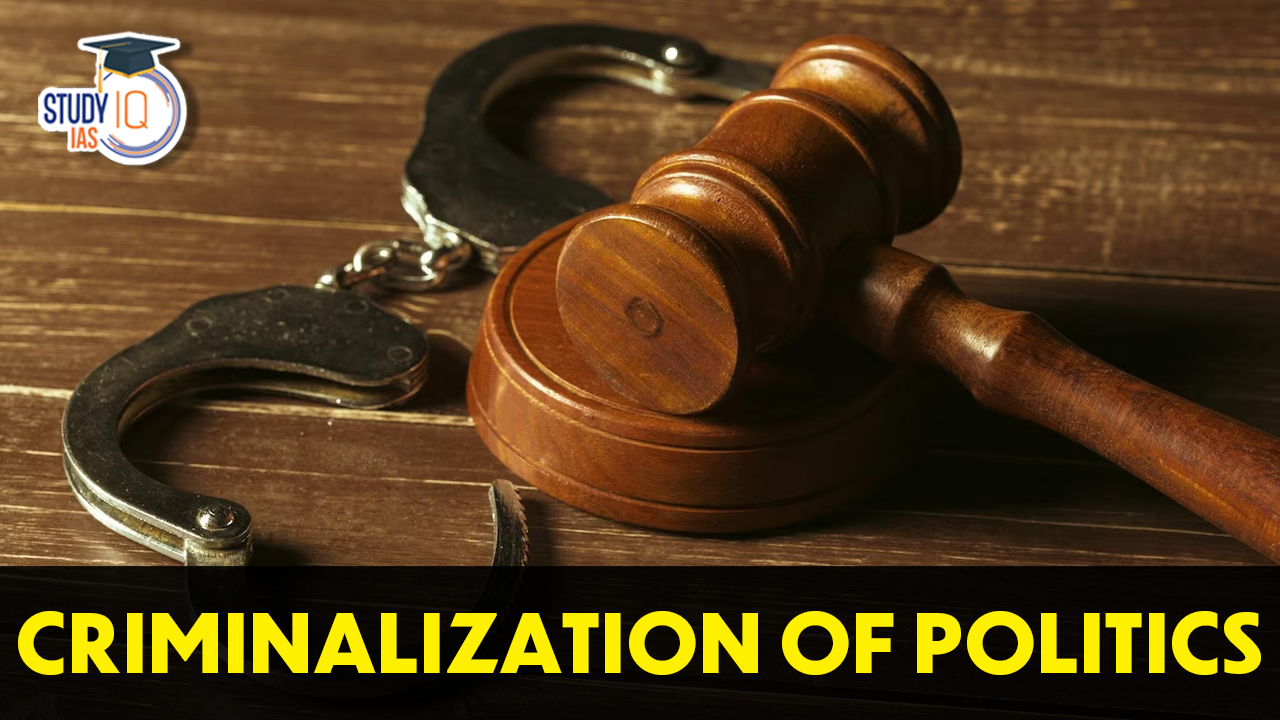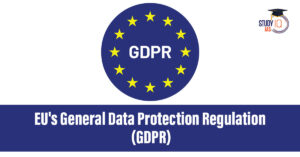Table of Contents
Context: The Association for Democratic Reforms (ADR) wrote to the Election Commission seeking action against parties that fail to publish details of criminal antecedents of candidates as per orders of the Supreme Court and the poll panel.
What is Criminalization of Politics?
- Criminalization of politics is defined as the situation when criminals participate in the politics of the government, i.e., contest elections and get elected to the Parliament and state legislatures.
- Supreme Court called criminalization of politics an “extremely disastrous and lamentable situation”, and raised concerns about “unsettlingly increasing trend” in the country.
Growing trend of Criminal Politics in India
- There is an increase of 109% (in 2019) in the number of MPs with declared serious criminal cases since 2009.
- 29% of those elected to the Lok Sabha in 2019 have declared serious crimes.
- Association for Democratic Reforms (ADR) analysis shows that candidates facing criminal charges had double the chances of winning as compared to those with clean record.
- ADR is an organization that has been working continuously to bring electoral and political reforms. It was established in 1999 by a group of professors from the IIM Ahmedabad.

Reasons for the Criminalization of Politics
- Vote Bank: Individuals and political parties do astronomical expenditure for buying the votes and for other illegitimate purposes. The politician’s link with the constituency gives rise to political crime.
- Corruption: Corruption is also an important factor in the criminalization of politics. The corrupted political member uses his powers for winning the elections not in a fair manner.
- Lack of governance: In India the distinctive thing is left politics is deep chasm between saying and doing. This happens at two levels. By the lack of governance there should be no proper agenda and not follow proper functions because of the lack of governance.
- Lack of intra-party democracy: In India, there is a lack of intra-party democracy, and the top leadership takes the decision on the candidates contesting elections. Thus, politicians with criminal records are able to escape the scrutiny of the ground level workers and organization of the party.
- Other reasons for criminalization of politics include:
- A partisan interfering in the investigation of crime and poor prosecution of cases.
- Massive delays of cases of criminal candidates over the years and high cost that is involved in the judicial proceedings.
- Unwarranted granting of parole and abundance withdrawal of the court cases.
Effects of Criminalization of Politics
- Affects good governance: When people with a criminal background become elected representatives, they may use their position to further their criminal interests. This negatively impacts the efficacy of the democratic process in delivering good governance.
- Limits the choice of voters: When criminals participate in politics and become candidates, it limits the choice of voters to elect a suitable candidate. This undermines the principle of free and fair elections, which is the foundation of democracy.
- Increases corruption: Criminals in politics may use their position to promote corruption, which leads to increased circulation of black money during and after elections. This affects the working of public servants and undermines the integrity of the electoral process.
- Reduces people’s faith in democracy: The involvement of criminals in politics can lead to social disharmony, violence, and set a bad precedent for future generations. This can reduce people’s faith in democracy as a system of governance.
- Undermines the quality of elected representatives: When people with criminal backgrounds become lawmakers, it reflects poorly on the nature of India’s state institutions and the quality of its elected representatives. It can further lead to ineffective governance and policymaking.
The Vohra Committee (1993) on Criminalization of Politics
- The Vohra Committee was a high-level committee formed by the Indian government in 1993 to investigate the nexus between organized crime, politicians, and bureaucrats in the country.
- The committee was formed in the wake of increasing concerns about the involvement of organized crime syndicates in politics and the resultant criminalization of politics in India.
- The committee submitted its report in October 1993, which contained several important findings and recommendations.
Some of the key findings of the report were:
- The nexus between organized crime and politics was deep-rooted and extensive, with criminals involved in a wide range of illegal activities such as extortion, smuggling, and drug trafficking.
- There was evidence of a nexus between criminals and politicians, with criminals providing money and muscle power to politicians in exchange for protection and support.
- The problem of criminalization of politics was not limited to any particular region or political party but was widespread across the country.
Some of the key recommendations were:
- Strengthening of law enforcement agencies to tackle organized crime. Creation of a national database of criminals.
- Electoral reforms to prevent candidates with criminal backgrounds from contesting elections.
- Strict enforcement of existing laws to ensure that politicians with criminal backgrounds are disqualified from holding public office.
Legal provisions for Disqualification of Criminal Candidates
- In this regard, Indian Constitution does not specify as to what disqualifies a person from contesting elections for the Parliament, Legislative assembly or any other legislature.
- The Representation of Peoples Act 1951 mentions the criteria for disqualifying a person for contesting an election of the legislature.
- Section 8 of the act, i.e., disqualification on conviction for certain offences, according to which an individual punished with a jail term of more than two years cannot stand in an election for six years after the jail term has ended.
- The law does not bar individuals who have criminal cases pending against them from contesting elections therefore the disqualification of candidates with criminal cases depends on their conviction in these cases.
Judicial measures to control criminalization of politics
- In Union of India (UOI) v. Association for Democratic Reforms and Anr, 2002, the SC held that every candidate, contesting an election to the Parliament, State Legislatures or Municipal Corporation, must declare their criminal records, financial records and educational qualifications along with their nomination paper.
- In Ramesh Dalal vs. Union of India, 2005, the SC held that a sitting MP or MLA shall also be subject to disqualification from contesting elections if he is convicted and sentenced to not less than 2 years of imprisonment by a court of law.
- The SC in Public Interest Foundation vs Union of India case, 2018 had also directed political parties to publish online the pending criminal cases of their candidates.
- In this case, the court left the matter of disqualification of politicians carrying criminal charges against them, to the Parliament saying that the court cannot add to the grounds of disqualification.
Suggestions to control the criminalization of politics
- Election Commission Recommendations: The Election Commission in its “Proposed Electoral Reforms” (2016) recommended that persons charged with cognizable offences should be debarred from contesting in the elections, at the stage when the charges are framed by the competent court provided the offence is punishable by imprisonment of at least 5 years, and the case is led at least 6 months prior to the election in question.
- 2nd ARC Recommendations: The Second Administrative Reforms Commission in its fourth report on Ethics in Governance (2008) made the following recommendations:
- Section 8 of RPA needed to be amended to disqualify all persons facing charges related to grave and heinous offences and corruption, where charges have been framed six months before the election.
- It also supported the proposal of including the filing of false affidavits as an electoral offence under Section 31 of Representation of the People Act, 1950.


 Daily Quiz 14 April 2025
Daily Quiz 14 April 2025
 UPSC Syllabus 2025, Check UPSC CSE Sylla...
UPSC Syllabus 2025, Check UPSC CSE Sylla...
 EU Plans to Slash General Data Protectio...
EU Plans to Slash General Data Protectio...





















